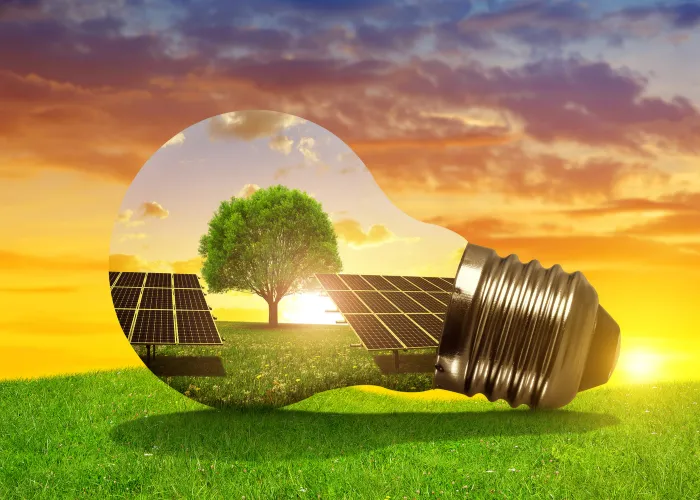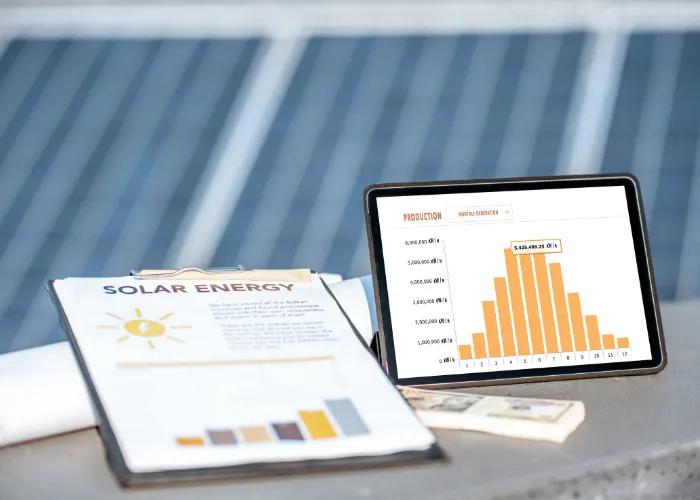Looking to generate income with solar panels? This comprehensive guide explores various ways to make money from solar panels, including selling excess energy back to the grid, participating in community solar programs, and more. Discover how to maximize your solar investment and start earning with renewable energy today.
Solar power is a clean, sustainable, and getting more and more cost-effective form of energy. It’s hardly surprising that more and more individuals are using solar energy to power their homes. Solar panels not only benefit the environment but also you financially and can generate income over time. We’ll look at how to use solar panels for profit in this blog.
Understanding Solar Energy

It’s important to understand the fundamentals of solar energy before inquisition further into how to generate money using solar panels. Photovoltaic cells in solar panels transform sunlight into energy. Solar panels make use of the electrical current created when sunlight strikes them to power items in your house or place of business. Monocrystalline, polycrystalline, and thin-film solar panels are only a few of the several varieties.
Installing Solar Panels
A. Finding a reputable installer:
It’s crucial to conduct research while looking for a reliable solar installer. The National Renewable Energy Laboratory’s (NREL) list of certified installers is a good place to start. You may also go online for evaluations of nearby installers or get recommendations from friends and family who have put up solar panels. To be sure you’re working with a skilled installation, search for credentials from organisations like the Solar Energy Industries Association (SEIA) or the North American Board of Certified Energy Practitioners (NABCEP).
B. Calculating the cost of installation:
The price of installing solar panels might vary based on a number of variables, including the size of the system, the kind of panels you select, and the location of your property. To receive an exact cost breakdown, it’s advisable to acquire a quote from a professional installation rather than using internet calculators or other resources.
C. Financing options:
There are various financing options available to help with the cost of solar panel installation, including loans, leases, and power purchase agreements (PPAs). Some states and municipalities also offer incentives and rebates for installing solar panels. Be sure to research all options and consider the long-term financial benefits of going solar.
Making Money with Solar Panels

A. Net Metering:
- How net metering works: Net metering is a billing arrangement where your utility company credits you for excess electricity your solar panels generate and feed back into the grid. The excess electricity is measured by a meter that spins backward when you’re generating more electricity than you’re using. The credits you earn can be used to offset future electricity bills.
- How it can help you make money: Net metering can help you save money on your electricity bill and even earn credits that you can use in the future. If you generate more electricity than you use, you can sell the excess back to your utility company for a profit.
B. Solar Renewable Energy Certificates (SRECs):
SRECs are certificates that indicate the advantages to the environment of producing one megawatt-hour (MWh) of solar energy. They can be sold to utilities or other organisations that have to satisfy standards for renewable energy.
To sell SRECs, you must register your solar panel installation with the SREC tracking system in your state. After your system has been registered, you are allowed to produce and sell SRECs to utilities or other organisations that have renewable energy needs.
C. Feed-in Tariffs (FITs):
FITs are laws that constrain utilities to pay a set price for energy produced from renewable sources. Usually, the government determines the rates, and they are long-term guaranteed.
To take part in FIT programmes, you must first decide whether your state or local government offers FIT policies. To make sure your solar panel system complies with the program’s criteria, you’ll also need to work with a qualified installer. After your system is set up, you may begin reselling your generated power to the grid at the prearranged fixed rate provided by the government.
Solar panel investment scheme in USA
A fantastic method to decrease your carbon footprint and save money on electricity prices is to invest in solar panels. Investors in the USA have access to a variety of solar panel investment plans. Here are a few schemes:
Solar Bonds: Solar Bonds are a sort of financial product that offers investors a fixed rate of return over a certain period of time and are issued by solar panel companies. With low risk, this investment may be an excellent choice for cautious individuals.
Solar REITs: A sort of investment that enables investors to hold a portion of a solar energy system is known as solar real estate investment trust (REIT). Investors receive a portion of the profits from the sale of the energy produced by these systems, which are mostly installed on commercial or industrial premises.
Solar Funds: To finance the development and operation of solar energy projects, solar funds are investment entities that aggregate cash from several investors. Large utility-scale projects as well as more modest residential solar systems are both eligible for investment from these programmes.
Solar ETFSs: ETFs that follow the performance of a selection of solar energy equities are known as solar exchange traded funds (ETFs). Without having to buy individual equities, these ETFs provide investors access to the solar energy market.
How much money can you make from solar panels?
The amount of money you may make from solar panels relies on a number of factors, including the size of the solar panel system, the quantity of sunshine your location receives, and the price of power in your region. Something to think about is as follows:
Size of the solar panel system: Generally speaking, a larger system will produce more power and hence have a higher potential profit.
Location: The quantity of power your solar panel system can generate will depend on how much sunshine your area gets. In general, areas with more sunshine will create more power and earn more money.
Energy prices: If the cost of power is high where you live, utilising solar panels to produce your own electricity might help you save even more money.
Incentives: Depending on where you live, you might be able to take advantage of government rebates or incentives to lower the price of your solar system and boost your return on investment.
How much profit do solar panels make?
The profit margin for most solar farms is between 10% and 20% since they may make up to $40,000 for every MW (Megawatt) installed.
How do solar leasing companies make money?
Solar leasing companies make money through a variety of revenue streams associated with leasing solar panels to homeowners or businesses. Here are a few ways they typically generate revenue:
- Lease payments: For the usage of their solar panel system, solar leasing firms charge households or businesses a monthly lease payment. The cost of the solar panels, their installation, and ongoing maintenance are normally covered by this contribution.
- Energy savings: Homeowners or companies may frequently reduce their power costs by producing their own electricity. When calculating the monthly lease payment, solar leasing firms may take these savings into account and may keep some of the savings as profit.
- Tax benefits: Several solar leasing firms advantage from the tax benefits provided by the government for the installation of solar panels. The business may lower the price of the solar panel system and boost their profit margin.
- Selling surplus energy: If a household or company produces more energy than they use, they can sell the extra to the grid. Companies that lease solar energy systems could agree to buy any extra electricity at a reduced price so they can resell it to other customers for a profit.
Conclusion
Solar panel revenue generation is not only a realistic possibility, but also one that is gaining popularity. There has never been a better moment to invest in solar power since solar panel systems are getting more affordable and because more people are becoming aware of the advantages of renewable energy.
There are several methods to make money with solar panels, from renting out your roof space to selling extra electricity to the grid. The initial investment is substantial, and it may take several years to see a return on investment, which is something that must be kept in mind. But, solar energy is a fantastic long-term investment that will help you lessen your carbon footprint, cut your energy costs, and even make you money
FAQ
How can I make money with solar panels?
With solar panels, you may generate your own electricity and resell any surplus to the grid, or you can get paid through government incentive schemes.
What are the incentives available for solar panel owners to make money?
Owners of solar panels may qualify for tax credits, rebates, feed-in tariffs, net metering, and renewable energy certificates as incentives (RECs).
How much does it cost to install solar panels?
The cost to install solar panels depend on the size of the system and the location that ranges from $10,000 to $30,000.
How long does it take to recover the investment in solar panels?
There are many including the cost of installation, how much power you consume, and any local incentives, will determine how long it will take for solar panels to pay for themselves. Between five and 10 years is the normal payback time.
Do I need to have a sunny location to install solar panels?
Solar panels can still be a sensible choice even in places with less sunshine but with not that much energy generation as compared to a a sunny location.
How do I find a reputable solar panel installer?
By conducting internet research, requesting recommendations from friends and family, or contacting trade associations like the Solar Energy Industries Association (SEIA) and the National Renewable Energy Laboratory, you may identify trustworthy solar panel installers (NREL).









